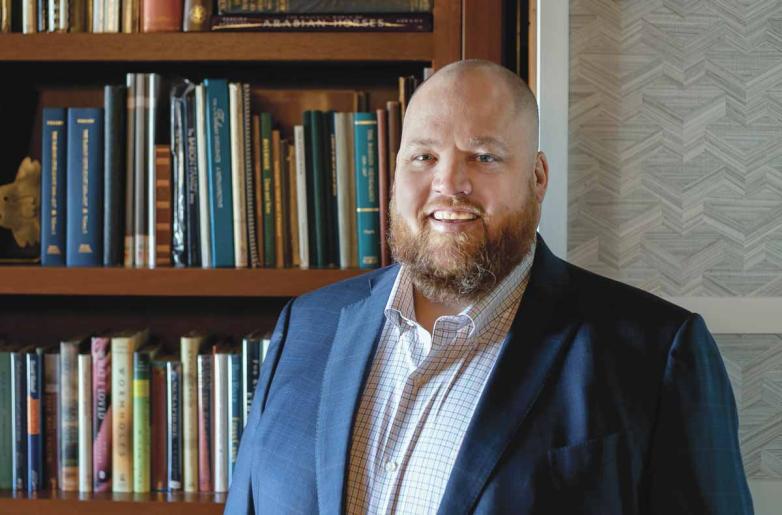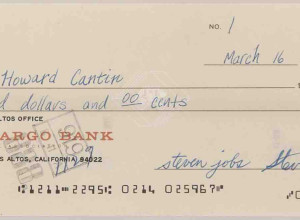Age: 48
Hometown/Residence: Denver, CO
Occupation: CEO of a family office
Main area(s) you collect: Ernest Hemingway/Lost Gen, Aesop's Fables and its variants, book art, children's books, fine bindings, travel and exploration
Number of volumes in your collection: ~2,500
First book you bought for your collection: I spent my whole end-of-year bonus at my first real job on a copy of Hemingway's In Our Time (Three Mountains Press, 1924). I hounded a Boston bookseller, who was located around the corner from my office, for several months before he relented and gave me a break (probably so I would stop pestering him).
Most recent book you bought for your collection: SOUTH (1919, Ernest Henry Shackleton), the story of Shackleton's expedition aboard the Endurance. First edition, first impression, with a remarkably nice example of the large folding map.
Most ever spent on a single item: My wife Molly will read this, so I'll say $11.40.
Best bargain: I was hunting for books near Mount Monadnock, New Hampshire, in the 1990s and I found a lovely store on the side of the road (there was a hot dog stand that shared its parking lot). The store was truly overstuffed with books and the seller said I was doing him a favor by purchasing a second edition of Graham & Dodd's Security Analysis and a beautifully bound, turn-of-the-century, seventeen-volume set of the works of Guy de Maupassant for a combined $20 because he needed the shelf space. I still get chills.
Favorite book in your collection: I have several pieces of correspondence, photos and an (until recently) unpublished manuscript from Ernest Hemingway, coupled with Scribner's office copy of The Torrents of Spring, that collectively tell a great story about how he went from a contract with Boni & Liveright to a lifelong partnership with editor Maxwell Perkins. It is a unique assemblage and offers insights into his character and his motivations between 1924-26.
How do you find books for your collection: Auctions and trusted booksellers and I have one colleague who has a hunting license for my desiderata.
Favorite bookseller/bookstore: He is a friend first and a bookseller second, but Dan Danbom at the Printed Page in Denver is a great human and as knowledgeable as they come.
Farthest traveled to buy a book: I took a round-trip-in-a-day flight to Chicago ten days after 9/11 to collect a book from an auction house, and it led to one of the bigger TSA search misadventures ever encountered. The book still shows the damage, and my emotional scars may never heal!
Holy Grail, or the One That Got Away: In December 1922, Ernest Hemingway was on assignment in Switzerland and his wife, Hadley Richardson, was in Paris and was planning to meet him with all of his papers and writing (originals and carbons) in a briefcase. While waiting at the Gare de Lyon, Hadley left the briefcase unattended, and it was stolen. Finding those papers would be a thrill.
Future plans for the collection: I am continually amazed at how vividly a favorite book picked up for the umpteenth time can localize the time and place of a first reading. I have a nine-year-old and I hope he develops the same admiration and curiosity that I have; if he does not, there are two institutions that have expressed interest in the collection.
What would you collect if you didn't collect books? I collect books, art, and wine, with the common denominator being I am collecting memories. Collections offer sensory transcendence: whether it is connection with friends, a wistful affection for something delicious, or an examination of a fragile thought, collections are a vehicle that feeds a passion. I've heard comparisons to addictions before but I think it is closer to worship—the kind that we most closely associate with religion or love.
Your advice for new collectors: Of course, you should collect what you love and you should become a lifelong student of the area of interest, which is half of the fun. The beauty of collecting books is you can collect on any topic and find unending joy in many dimensions of collecting, including: knowledge and learning, aesthetics, or pride of ownership. However, drinking in contents and context is when books have achieved the full measure of being books. If you drink a bottle of wine, you're left with an empty bottle; if you read a book, it remains intact and retains its value, but you've improved.

















